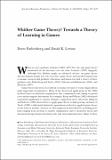| dc.contributor.author | Levine, David K. | |
| dc.contributor.author | Fudenberg, Drew | |
| dc.date.accessioned | 2018-03-02T21:51:43Z | |
| dc.date.available | 2018-03-02T21:51:43Z | |
| dc.date.issued | 2016 | |
| dc.identifier.issn | 0895-3309 | |
| dc.identifier.uri | http://hdl.handle.net/1721.1/113940 | |
| dc.description.abstract | Game theory has been a huge success in economics. Many important questions have been answered, and game theoretic methods are now central to much economic investigation. We suggest areas where further advances are important, and argue that models of learning are a promising route for improving and widening game theory's predictive power while preserving the successes of game theory where it already works well. We emphasize in particular the need for better understanding of the speed with which learning takes place. | en_US |
| dc.publisher | American Economic Association | en_US |
| dc.relation.isversionof | http://dx.doi.org/10.1257/jep.30.4.151 | en_US |
| dc.rights | Article is made available in accordance with the publisher's policy and may be subject to US copyright law. Please refer to the publisher's site for terms of use. | en_US |
| dc.source | American Economic Association | en_US |
| dc.title | Whither Game Theory? Towards a Theory of Learning in Games | en_US |
| dc.type | Article | en_US |
| dc.identifier.citation | Fudenberg, Drew, and David K. Levine. “Whither Game Theory? Towards a Theory of Learning in Games.” Journal of Economic Perspectives, vol. 30, no. 4, Nov. 2016, pp. 151–70. | en_US |
| dc.contributor.department | Massachusetts Institute of Technology. Department of Economics | en_US |
| dc.contributor.mitauthor | Fudenberg, Drew | |
| dc.relation.journal | Journal of Economic Perspectives | en_US |
| dc.eprint.version | Final published version | en_US |
| dc.type.uri | http://purl.org/eprint/type/JournalArticle | en_US |
| eprint.status | http://purl.org/eprint/status/PeerReviewed | en_US |
| dc.date.updated | 2018-02-22T14:30:51Z | |
| dspace.embargo.terms | N | en_US |
| mit.license | PUBLISHER_POLICY | en_US |
